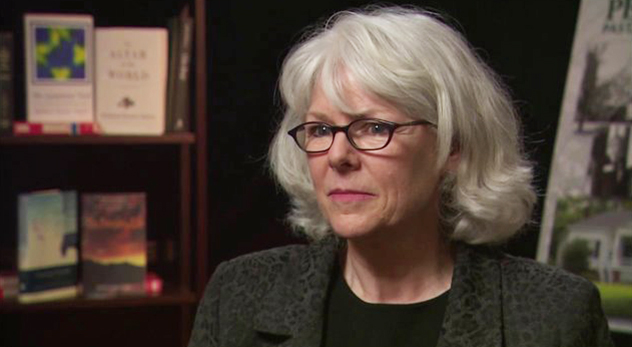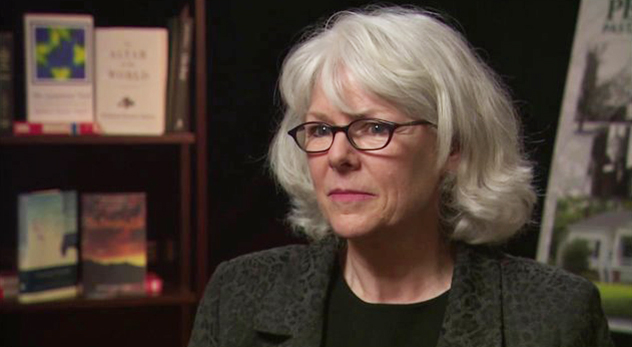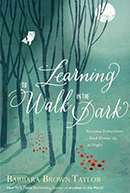
Barbara Brown Taylor is a theologian, priest, and New York Times bestseller of many books, including her most recent “Learning to Walk in the Dark.” – Image courtesy of author
Yesterday, I published the first part of my interview with Episcopal priest and New York Times bestselling author Barbara Brown Taylor. In it, we explored her new book Learning to Walk in the Dark and how she wants to help Christians explore what she calls “lunar spirituality.” Below is the second part, in which Taylor and I discuss personal topics such as what she believes makes one Christian, if she believes in a literal devil, and whether she is afraid of dying.
RNS: You’ve talked a lot about your journey out of the church world. What do you consider yourself now? Christian or Episcopalian or something else?
BBT: It’s true that a wrote a book called Leaving Church in which I detail leaving parish ministry, but I’m still very much involved in the church world. I end up speaking and lecturing in church settings at least twice a month. So I haven’t journeyed out of the church at all as far as I can tell. I’d say I consider myself a practicing Christian and in April I’ll celebrate my 30th anniversary as a priest in the Episcopal church. So I’m an active and practicing Christian, though I’m as bad at it as most of us are.
RNS: So if you’re a Christians and other who have very different beliefs and practices than you are too, what makes a person a Christian exactly?
BBT: I can call myself a Christian, and there are bodies of Christians who could disagree with me based on their own criteria about what makes a real Christian. But I think a lot of us are rethinking what it means to be Christian. And a lot of us are rejecting other people’s rejection of us as Christians. At this point in my life, I am pretty willing to let people tell me whether or not they are Christian rather than imposing my own definitions of it on them. My base definition is “here she says, here she is a Christian.”
What I don’t think is working so well–except perhaps for very tightly enclosed communities themselves–is defintions of what makes one truly Christian or not. That may be why we have more than 900 denominations in this country.
RNS: In your new book, you point out that Christian teaching thrives on dividing reality into opposed pairs: good vs. evil, church vs. world, flesh vs. spirit, light vs. dark. How do you think we’ve gotten this wrong?
BBT: I learn a lot about how people conceive of reality by listening to the way they talk. I’ve talked Christian for a really long time, and I think Christians are so used to dividing reality into opposed pairs that a lot of us don’t even hear the opposition anymore. The divisions are there in our scripture, in our prayers, in our worship services, in our hymns.
I don’t know that we’ve gotten it wrong exactly. These may be useful ways to focus on the virtues we want more of and the vices we want to avoid. But I’m struck by the ways in which this kind of language can lead to “enemy thinking.” If you use it long enough without thinking about what you’re saying, you can regard the body, the world, the darkness as spiritual enemies. And I think that goes against some of the central affirmations of Christianity. That God made human beings in God’s own image. That God so loved the world. That God is the God of darkness and of light.
To continue to divide reality into opposed pairs, I think, requires another God for that other reality. Needless to say, once you’ve gone there you’ve lost the central Christian narrative, which is, there is only one God.
RNS: In your theology, is “the Devil” a literal person? Is it someone who lives in the darkness or something we Christians have invented?
BBT: I find the Devil absent in the Hebrew Bible except for the book of Job where the Devil works for God as God’s prosecuting attorney. Actually, it is “Satan” here. So it is very curious to me how the Devil gets such a big role in the New Testament.
But for me, when I look at addiction or sex slavery or murder or all the wretched things people can do, and when I talk to people who commit those things, I find people talk as if they were in the grip of something beyond their control. I can only imagine that there is a strong force for death that goes along with a strong force for life. But I’m not willing to oppose that to God. I may be one of the few Christians who just wants to hold out that there is one God, and if there is anything like a fallen angel named Satan, we still have within us enough of the divine to continue to choose life. I’m not ready to give power to a devil who can beat God.
RNS: You’re a part of mainline Protestantism, which has been in sharp decline for some time. A lot of evangelicals say that this decline in mainline Protestantism is due to liberalism. What say you?
BBT: I don’t know. I cut my teeth in the evangelical church. That’s how I came into Christianity in college. So I think I know both movements fairly well. I gravitated toward a more liberal Protestantism because of its wider embrace, its reluctance to hold people to certain standards of what it meant to be Christian. For some, that feels soft. It doesn’t feel very faithful to be friendly towards people of other faiths, for example. I tend to think there is less impetus to become part of a group that is pretty happy to let anybody in. It doesn’t feel as strong or righteous or as hard in drawing boundaries.
But I’m but I’m happy to be part of a little dwindling minority. I think a lot might happen once we’ve lost some buildings and some power.
RNS: There are several references in the book to your age in your book. How much are you thinking about aging these days?
BBT: A lot, clearly. I’m 62, but I’m a happy 62. I don’t wish to be 61 or even 60. But I am very aware that I have less time left than I have already spent. By the epilogue of this book I think I realize that life is a lot about loss. That doesn’t have to be associated with age necessarily. That’s just part of being alive. There is nothing abnormal or punishing about it. To live is to lose.
It seems to me that it makes a better life with God and in the spirit to live with the presence of that. It requires perhaps even better spiritual skills to live with loss than it does to beat back loss. Age is a great help in that regard.
RNS: Tell me, 62-year-old Barbara Brown Taylor, are you afraid of dying?
BBT: I’m afraid of dying but I don’t think I’m afraid of being dead. Since I was an adolescent, I’ve been preternaturally aware of my mortality. It even may have something to do with why I chose ministry and have remained a priest all of these years. Because you deal a lot with people who are in the last stages of their lives, either at three months old or 93-years-old. I’ve sat with people through that whole gamut. It’s impossible to be clergy and not deal with the reality of death.
Death is now closer for me. But life becomes more precious as life becomes more limited. Like anyone else my age, I hope I keep my brain and I hope I keep my mobility. But even if the worst comes then I hope to fall into that darkness with some kind of trust in the divine.
RNS: Whenever that day of death comes for you, how do you hope people will remember Barbara Brown Taylor?
BBT: I don’t expect to be remembered. Maybe for 10 years. And that seems right. You’re active in your own time. Only a few people become immortal, but not because they plan to. The rest of us just go back to the dust. I would like to be remembered as someone who said and wrote things that all of us think but aren’t willing to write. That would be a good legacy.







